Tuesday 29 December President Salva Kiir swore in new governors for South Sudan’s restructured 28 states. Members of the SPLM (IO) advance team and the SPLM held a joint meeting in Juba. Wednesday 30 December The leader of the Federal Democratic Party (FDP), a splinter group of the SPLM (IO), clarified that it has not… Read more »
In Defence of the Reviled 20th century

The 20th century comprised a long stride towards a more peaceful world. (Pixabay CC0 Public Domain)
The century of peace. The 20th century laid the foundations for what could make our century a century of peace.
The 20th century is often referred to as the bloodiest in human history. Towards the end of that century, the historians Eric Hobsbawm, Gabriel Kolko and Niall Ferguson published general narratives entitled, respectively, Age of Extremes, Century of War, and The War of the World.
Last year there were many publications warning against the outbreak of a new world war of the same kind as the one unleashed by the Guns of August one hundred years earlier.
Yet, in spite of all the turmoil in Ukraine and the Greater Middle East, and the squabbles in the South China Sea, we came nowhere near a world war.
In our view, despite the two world wars, the Holocaust, the gulags, the atomic bomb, Maoism, the Khmer Rouge, and Rwanda, the 20th century should not be reviled. It comprised a long stride towards a more peaceful world. Moreover, the century became more peaceful as it drew to a close, thus creating a real possibility of making our century into a century of peace.Read More
This Week in South Sudan – Week 52
Monday 21 December SPLM (IO)’s team of delegates arrived in Juba. At least one child was killed and three others injured in aerial bombardments in Khor Tumbak. Officials in Maban County, Upper Nile state, blamed the attack on the Sudanese Air Force. Tuesday 22 December South Sudan’s central bank sold US$20 million to 13 commercial… Read more »
A Drama in Several Acts
Nearly five years since Tunisia’s revolution began to spread, the hopes and expectations of democracy have been replaced by despair and fear of what will follow.
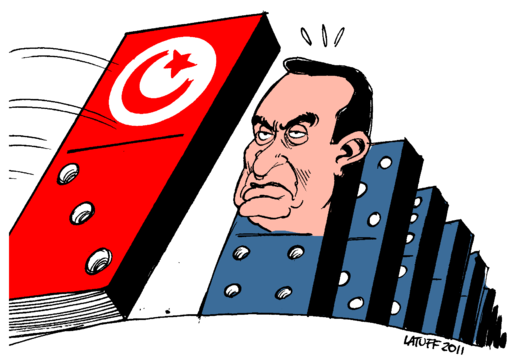
“In their despair over the current situation, some people are falling victim to the temptation to look back with nostalgia to the old regimes”. Hosni Mubarak facing the Tunisian domino effect. Carlos Latuff 2011.
This has been an important and proud autumn for Tunisia and the Tunisian people. Ever since the Chair of the Nobel Committee, Kaci Kullmann Five, announced in October that the Peace Prize had been awarded to the Tunisian National Dialogue Quartet (and once everyone had discovered via Google that the Quartet was not in fact a group of jazz musicians) the “Tunisian Model” has quite rightly received much praise and attention. Read More
This Week in South Sudan – Week 51
Monday 14 December The South Sudanese government has ordered SPLA to pursue a new rebel group in Eastern Equatoria state. This is connected to recent clashes between government forces and the rebels in Oguruny village. The so-called ‘Arrow Boys’ claimed their forces occupies several locations in Western Equatoria state, warning the government not to provoke… Read more »
Bosnia 20 Years On
The Dayton agreement ended the war. But with children from different ethnic groups unable to attend school together in many places, its intentions concerning reconciliation have unfortunately not been realized.
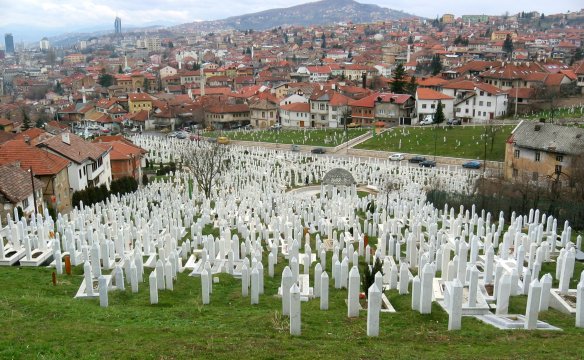
Martyrs’ memorial cemetery Kovači in Sarajevo. Photo: Michael Büker
“Of course I don’t need good grades in Bosnian when I’ve got good grades in English,” says a 13-year-old to his father in Sarajevo. The boy, who usually does well at school and has consistently good grades, has this year done slightly worse than usual in Bosnian, which is his mother tongue. His father is concerned. “But, why don’t you need good grades in Bosnian?” asks the father, with some astonishment. His son is quick to provide an explanation: “I won’t live here when I’m grown up. I’ll have to go somewhere else to find a job. For that it’s more important to know English than Bosnian.”
Read More
Myanmar: What now for Women and Minorities?
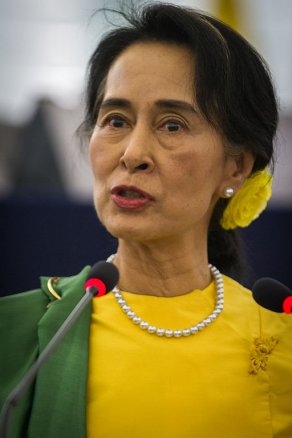
Photo: Claude Truong-Ngoc
Will Aung San Suu Kyi dare to engage in a direct confrontation with religious nationalism and insist that the new parliament reconsider Myanmar’s laws on race and religion? Doing so could cost her dearly.
Sexual violence
Myanmar (formerly known as Burma) has been in a continuous state of civil war since its foundation as a state in 1948. Different ethnic minorities have opposed the central government, because they view the state as illegitimate. The resulting wars have led to enormous suffering for women, men and children. War affects women and men differently, however. A particularly serious consequence has been the army’s use of sexualized violence against ethnic minority women. Violence against women is a widespread problem, but Burma offers little legal protection to victims either of domestic violence or of various forms of sexualized violence. In addition, women have been omitted systematically from peace negotiations between rebel groups and the state. Consequently, 52% of the country’s population is not included in the process of building political foundations for future peace.Read More
An Academic New Year’s Resolution for Colombia: Understanding Continued Gendered Violence as a Threat to Positive Peace
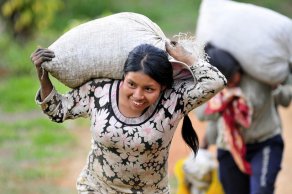
Photo: Neil Palmer (CIAT)
Over the last decade, Colombia has been host to the world’s largest population of internally displaced people (IDP). In 2016, it is expected that the Colombian government and FARC will reach a peace agreement, marking the formal end of more than 50 years of civil war. It is widely recognized that this peace agreement will not resolve the immediate causes of displacement, but rather generate one kind of settlement in a context of longstanding and complex uses of violence.
At present, contradictory tendencies seem to be at play: While periods of 2015 have seen the lowest levels of violence recorded on a national level since 1975, threats against civil society actors are increasing at an alarming rate.
Is it Strange that Dictators Hold Elections?
Why do dictators hold elections that merely play to the gallery?
On 11 October, Alexander Lukashenko was re-elected as president of Belarus with an impressive 84 per cent share of the vote. The election was anything but free and fair. According to the OSCE, Belarusian law makes it impossible for the will of the people to be realized and, as if that were not enough, the election itself was characterized by fraud. Lukashenko’s regime had invested significant resources in preventing the election from being meaningful. So what was the point of holding it? Why do dictators hold elections that merely play to the gallery?
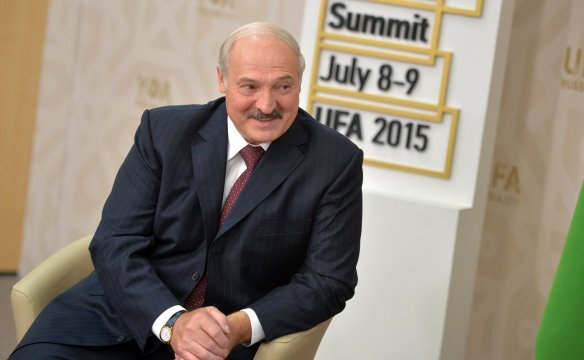
Alexander Lukashenko during this year’s 7th BRICS summit in UFA. PHOTO: CC BY 4.0
The fact that regimes like Lukashenko’s hold elections is even more surprising when one takes into account the fact that doing so is often extremely hazardous for a regime. Recent research conducted by myself, in collaboration with Carl Henrik Knutsen and Tore Wig of the University of Oslo, showed that around three times as many regimes fall in the year after an election as in the year before.
This Week in South Sudan – Week 50
Monday 7 December Vice President James Wani Igga met with a representative from the SPLM-Former Detainees and the SPLM (IO) to confidentially discuss the return of opposition members to Juba. South Sudan’s government demanded the SPLM (IO) to drastically reduce the number of members on their advance team scheduled to return to Juba. Tuesday 8… Read more »